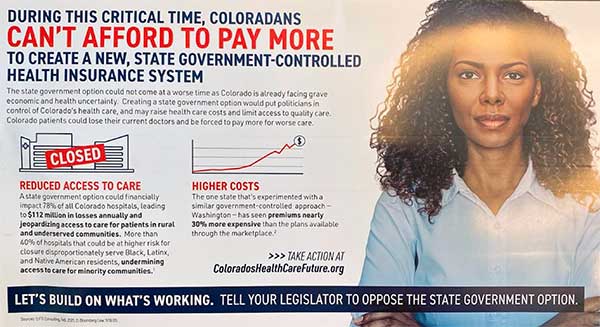
CO-04 (Special Election)
See Full Big Line
(R) Greg Lopez
(R) Trisha Calvarese
90%
10%

President (To Win Colorado)
See Full Big Line
(D) Joe Biden*
(R) Donald Trump
80%
20%↓

CO-01 (Denver)
See Full Big Line
(D) Diana DeGette*
90%

CO-02 (Boulder-ish)
See Full Big Line
(D) Joe Neguse*
90%

CO-03 (West & Southern CO)
See Full Big Line
(D) Adam Frisch
(R) Jeff Hurd
(R) Ron Hanks
40%
30%
20%

CO-04 (Northeast-ish Colorado)
See Full Big Line
(R) Lauren Boebert
(R) Deborah Flora
(R) J. Sonnenberg
30%↑
15%↑
10%↓

CO-05 (Colorado Springs)
See Full Big Line
(R) Dave Williams
(R) Jeff Crank
50%↓
50%↑

CO-06 (Aurora)
See Full Big Line
(D) Jason Crow*
90%

CO-07 (Jefferson County)
See Full Big Line
(D) Brittany Pettersen
85%↑

CO-08 (Northern Colo.)
See Full Big Line
(D) Yadira Caraveo
(R) Gabe Evans
(R) Janak Joshi
60%↑
35%↓
30%↑

State Senate Majority
See Full Big Line
DEMOCRATS
REPUBLICANS
80%
20%

State House Majority
See Full Big Line
DEMOCRATS
REPUBLICANS
95%
5%
 April 16, 2021 02:38 PM UTC
April 16, 2021 02:38 PM UTC 14 Comments
14 Comments

The Colorado Option has the potential to reduce insurance company profits so you should oppose it.
Colorado's Health Care Future is a subsidiary of Partnership For America's Health Care Future. The national group – hard to believe – has the involvement of major drugmakers, insurance companies and private hospitals, and has poured serious money into the fight against M4A. I know this diary's about the mailers, but the TV ads suck too, and they're on constantly so they can't be hurting for filthy lucre.
If, from just looking in the trash can by my apartment buildings mail box, it seemed a lot of the flyers ended up going to the landfill.
Sounds like your lobby ought to have a recycling bin.
Can we bus them to Kansas and let them perish on Mount Sunflower?? If they’re stupid enough to die on a hill over this issue it just as well be one where we don’t have to scale the face of an actual mountain to recover their rotting corpses.
We might be more successful in tempting them to mount their opposition on Pike's Peak (Iowa).
Recover? Vultures need to eat too!
I agree the premises you examine are laughable, but look at all the dog whistles in this piece and I'd say the Republicons know their audience.
Struggling white Gerber baby family on the front, and an angry black woman (Harris?) is literally "behind" it all. Hello "white replacement" theory. Also, note that they focus on closures of rural hospitals due to rising costs. True or not, those who received this out in the hinterlands are going to have questions.
Republicons don't run on logic, they run on fear and, if you're already afraid, they're doing a good job here scaring you shitless.
Perhaps Gertie or Duke or Michael can weigh in on this issue. Sunday Denver Post is looking at the Colorado Option from the perspective of small rural hospitals, like the one in Fruita.
The Pols writer says “the first argument (hospitals in Colorado could lose money) is so laughable that it’s easy to dismiss…..”
We will gently assume that the writer is an urban progressive. Let’s hear what the rural folks have to say.
I’ll ask one of our local board members. It’s hard to turn the squelch high enough to tune out all the bullshit out east. After a near two-decades of weekly bs printed in the local paper by Brophy, Hillman, Sonnenberg, Pelton that starts with the premise that everything talked about, proposed, and/or passed by the Democrats is evil and an assault on our way of life, it’s hard to get to the facts.
It’s not implausible this will turn out to be a boon for rural health systems. As with our renewable energy standards journey, the ones complaining the loudest at the onset are also the ones most likely to enjoy the benefits of its execution.
I remember seeing an article about how health care in the San Luis Valley was really helped by Obama’s Expanded Medicaid. People who couldn’t afford health care before, now could, which meant more business for the local health care. If this gets more of the uninsured covered, or helps people to get health care without insane levels of deductables and bankrupting co-pays, it could very well mean more customers for rural health care.
Canyon View in Fruita, formerly known as Family Health West, is no small-town struggling rural hospital. Perhaps the author should visit a real one. Meeker or Delta come to mind. Perhaps Cortez. A map would be helpful for the metrocentric writer to get out more.
In Yuma County (pop. 10,000) we have two nearly-new hospitals (Wray, Yuma) with full clinics. We are really fortunate to have the health infrastructure we have.
How it sounds to my ears ….
Proponents: We want you to live.
Opponents: We want you to die.
Proponents: We want you to live.
Opponents: We want you to die.
Across COVID, public health issues, quack cures, and denying of health care, the Republicans are now clearly the Pro-Death Party.